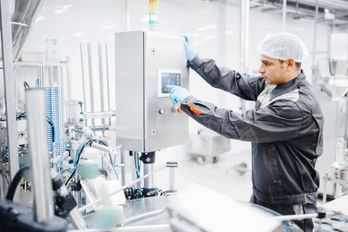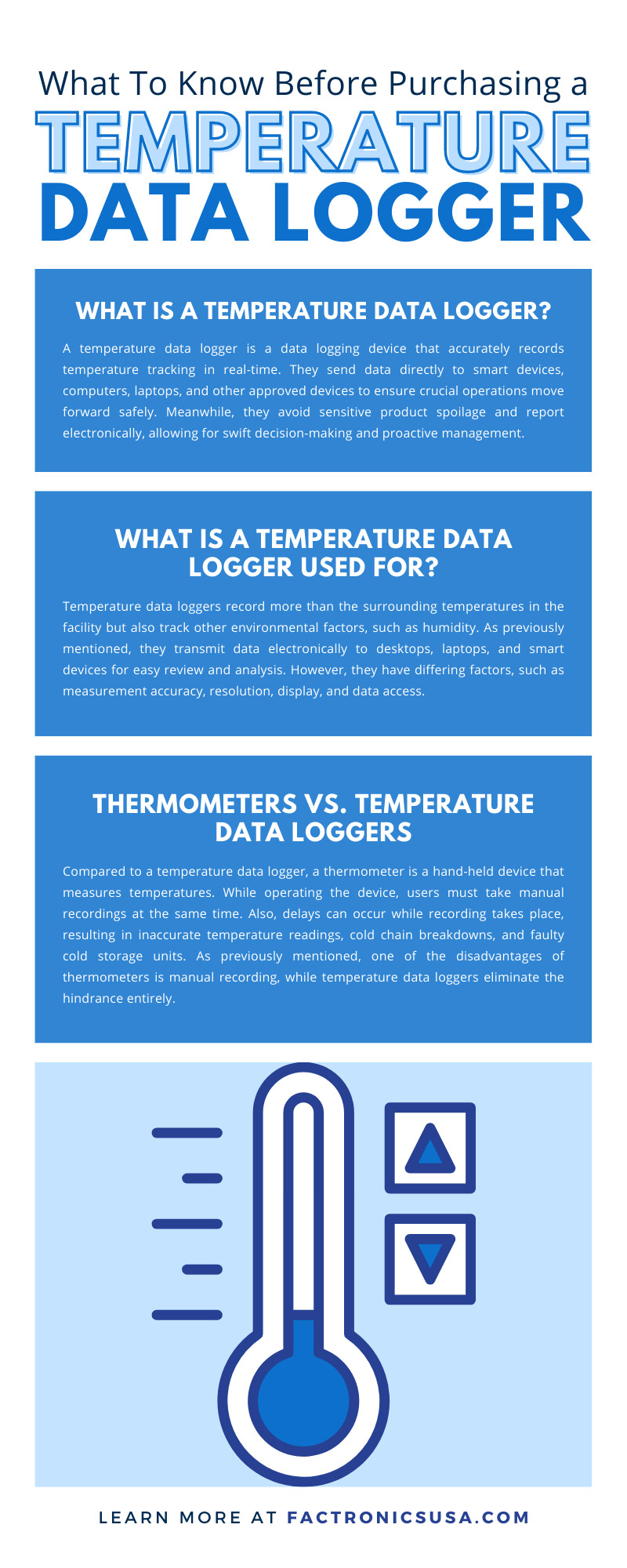
With today’s regulations, there has been a heavy reliance on temperature monitoring for transportation and logistics. Numerous industries have turned their attention towards the benefits and features that temperature data loggers offer, making for an easier and effortless way to track real-time data in the facility. So, what exactly is a temperature data logger, and what does it offer for various industries?
Let’s discuss what to know before purchasing a temperature data logger, its benefits, and how it differs from a standard thermometer. Accurate and reliable data are crucial factors for temperature data loggers, especially when storing food or pharmaceuticals properly while adhering to legal regulations.
What Is a Temperature Data Logger?
A temperature data logger is a data logging device that accurately records temperature tracking in real-time. They send data directly to smart devices, computers, laptops, and other approved devices to ensure crucial operations move forward safely. Meanwhile, they avoid sensitive product spoilage and report electronically, allowing for swift decision-making and proactive management.
Temperature data loggers also act independently from computers and come in various shapes and sizes to fit many types of facilities. They also provide device capability to handle hundreds of different inputs, in most cases enabling to measure humidity and temperature. You can retrieve the recorded data through the data logger or wireless transmissions via smart devices.
What Is a Temperature Data Logger Used For?
Temperature data loggers record more than the surrounding temperatures in the facility but also track other environmental factors, such as humidity. As previously mentioned, they transmit data electronically to desktops, laptops, and smart devices for easy review and analysis. However, they have differing factors, such as measurement accuracy, resolution, display, and data access.
Companies use different types of data loggers, such as stationary, wired, USB, wireless, and mobile models. Depending on the company’s needs and the facility provided, the type of data logger you choose can significantly improve data tracking. Some industries that use temperature data loggers include health care, agri-food, environmental, pharmaceutical, and more.
Thermometers vs. Temperature Data Loggers
Compared to a temperature data logger, a thermometer is a hand-held device that measures temperatures. While operating the device, users must take manual recordings at the same time. Also, delays can occur while recording takes place, resulting in inaccurate temperature readings, cold chain breakdowns, and faulty cold storage units. As previously mentioned, one of the disadvantages of thermometers is manual recording, while temperature data loggers eliminate the hindrance entirely.
Temperature data loggers have continuous monitoring by working at an uninterrupted pace and provide continuous real-time monitoring. Moreover, data loggers provide automated notifications and reports to the user, which get transmitted through email or other means. Temperature data loggers make for an effortless means of tracking data through an easy interface.
Benefits of Temperature Data Loggers
Temperature data loggers come with a variety of benefits. Firstly, they automatically collect data on a 24-hour basis and can become left unattended with proper configuration. Data loggers can also record the vital information needed during its entire monitoring period, all while tracking the environmental conditions in the area, such as humidity and air temperatures.
Another benefit to using temperature data loggers is that they’re a fast and cost-effective way to track environmental surroundings and provide thermal mapping for equipment, validation studies, and more. Lastly, they can follow from as short as seconds to as long as months at a time, providing programmable devices capable of tracking hundreds of temperature readings.
What To Consider Before Purchase
So, what should the buyer know about temperature data loggers? Before making the initial purchase, it’s crucial to go over the various needs of the laborers and the features that can help improve productivity. Let’s discuss the different considerations before investing in a temperature data logger.
Helpful and Convenient Features
The desirable benefits of a temperature data logger include its convenient and helpful features. Each temperature data logging model should come with a feature list that gives you an idea of its reliability and functionality.
Compare the various features of each model that grabbed your interest and see which model provides solutions and best caters to your business needs. Some features include broad deployment options, visual displays, expansive memories, and firmware upgrades. The features it provides should also be worth the investment you make.
Quick Data Access
Another consideration to make before purchasing a temperature data logger is the data access features. Data access should always remain convenient and require little to no strain. So, take the time to know how you want to access your tracked data.
Temperature data loggers offer a variety of ways to provide the data you need. While one model can allow the user to download data directly onto a computer through a USB, another can enable a central location to submit real-time data wirelessly. Some models are also compatible with Bluetooth devices for easy and quick data access.
Regular Temperature Monitoring System Reviewing
After calibrating and installing your temperature data logger’s system, it’s crucial to consider routine checkups and reviews. The last thing you want is to push back or ignore regular checkups by a professional, as it can lead to malfunctions, slowness, and irreparable damage to the hardware.
Some checkups include reviewing technical issues, ensuring the setup is correct, and checking for calibrations. By setting up routine checkups and reviews, your temperature data logger can run to or beyond its expected lifespan, all while offering continuous reliability.
Company Reputation
Before purchasing the first temperature data logger you see, it’s crucial that you choose a system that comes from a reliable, reputable company. Because temperature data loggers need to maintain accuracy in their measurements, the company you purchase from needs to have quality products and an established reputation.
Take the time to review customer and company reviews, browse their catalog, and get to know the company’s experience. It can help you make a better-informed decision and make a proper investment.
You should invest in a temperature data logger that comes from a reliable and experienced company. At Factronics USA, we carry reliable, real-time temperature monitoring and data transmission equipment to follow legal regulations in your industry. Our temperature data loggers help monitor transport, create protocols for quality control, and identify problems, all to help increase productivity and safety. If you have any questions about our temperature data logging equipment, reach out to us today! We’ll help you get started and find the right data logger for your facility.

